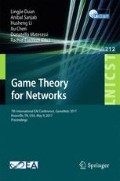Abstract
This study presents an adaptation of finite population evolutionary stable strategy definition by Schaffer in [1, 2] to perfect information extensive form games. In this adaptation, players reach a finite population evolutionary stable strategy equilibrium by using finite population evolutionary stable strategies which ensure that the game ends up with equal payoffs. We studied the fpESS equilibria of some famous two-player bargaining games such as the ultimatum game, the dictatorship game and a dollar auction game. Not all Perfect Information Extensive form games have an fpESS equilibrium. However, when there exist an fpESS equilibrium in these games, the outcome is a perfectly fair one; that is, all players get equal payoffs.
Access this chapter
Tax calculation will be finalised at checkout
Purchases are for personal use only
References
Schaffer, M.E.: Are profit-maximizers the best survivors? J. Econ. Behav. Organ. 12, 29–45 (1989)
Schaffer, M.E.: Evolutionary stable strategies for a finite population and a variable contest size. J. Theor. Biol. 132, 469–478 (1988)
Forsythe, R., Horowitz, J.L., Savin, N.E., Sefton, M.: Fairness in simple bargaining experiments. Games Econ. Behav. 6(3), 347–369 (1991)
Oosterbeek, H., Sloof, R., Kuilen, G.: Cultural differences in ultimatum game experiments: evidence from a meta-analysis. Exp. Econ. 7(2), 171–188 (2004)
Duersch, P., Oechssler, J., Schipper, B.C.: Pure Saddle Points and Symmetric Relative Payoff Games. Working Papers 0500, University of Heidelberg Department of Economics (2010)
Osborne, M.J.: An Introduction to Game Theory. Oxford University Press, New York (2003)
Shubik, M.: The dollar auction game: a paradox in noncooperative behavior and escalation. J. Conflict Resolut. 15(1), 109–111 (1971)
Leininger, W.: Escalation and cooperation in conflict situations the dollar auction revisited. J. Conflict Resolut. 33(2), 231–254 (1989)
Slantchev B.L.: http://slantchev.ucsd.edu/courses/gt/05-extensive-form.pdf
Author information
Authors and Affiliations
Corresponding authors
Editor information
Editors and Affiliations
Rights and permissions
Copyright information
© 2017 ICST Institute for Computer Sciences, Social Informatics and Telecommunications Engineering
About this paper
Cite this paper
Vargün, A., Dalkılıç, M.E. (2017). On the Finite Population Evolutionary Stable Strategy Equilibrium for Perfect Information Extensive Form Games. In: Duan, L., Sanjab, A., Li, H., Chen, X., Materassi, D., Elazouzi, R. (eds) Game Theory for Networks. GameNets 2017. Lecture Notes of the Institute for Computer Sciences, Social Informatics and Telecommunications Engineering, vol 212. Springer, Cham. https://doi.org/10.1007/978-3-319-67540-4_5
Download citation
DOI: https://doi.org/10.1007/978-3-319-67540-4_5
Published:
Publisher Name: Springer, Cham
Print ISBN: 978-3-319-67539-8
Online ISBN: 978-3-319-67540-4
eBook Packages: Computer ScienceComputer Science (R0)

